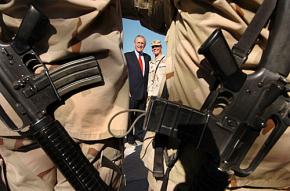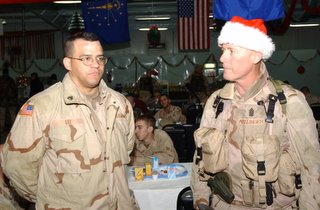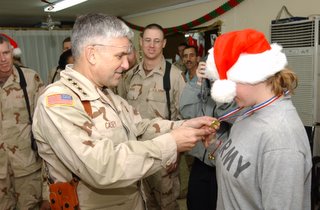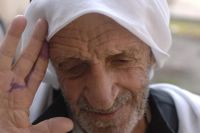My job may not have looked dangerous on paper, but I was exposed to some of the heaviest combat in northern Iraq. As a public affairs soldier, I documented and promoted the soldiers’ work. I accompanied the infantry on raids, patrols and school openings. On almost every mission, I experienced the highest level of stress imaginable.
To this day, when I tell people my job, they say, “Oh so all you did was take pictures. You weren’t on the front lines.” This adage certainly frustrates me like a leadoff hitter in a slump. Was my service negated because I carried a camera? Was I not a soldier just because my job was different? Although I do not feel the need to justify my duties or experiences, I am always hurt by people’s first impression of my position. To help them understand, I discuss Iraq.
I tell the questioners about the first car bombing I documented. The suicide bomber targeted an American base in Mosul, but the bomb detonated prematurely and the only two people killed were a mother and her little girl. When I photographed the scene, I came across a little 4-inch foot that lay in the street like a piece of garbage. I photographed it all and the images of the girl’s remains still haunt me.
I tell them about June 24, 2004, when I documented another car bomb that ripped through an Iraqi police station. After I took the needed photographs, we left the site. On our way back to headquarters, another unit received fire from a mosque. We stopped in the middle of the road, blocking the intersection that led to the mosque. When the firefight seemed to cease, we were ambushed. A white van pulled up in an empty field and several men exited. All carried weapons. One fired an RPG to our direction. As the rocket flew directly toward me, time suspended. I knew I was going to die. My life flashed before my eyes. Just as I lost hope, the RPG landed 10 feet in front of me. It was a dud. And we killed the attackers. Their bodies fell to the earth like tiny trees being knocked down by the wind. Shortly thereafter, we were attacked again. This time, they got away.
I tell them of the time I was in Avgone, a small town near Tal Afar. We patrolled through woods that looked more like Vietnam than Iraq. A team of insurgents awaited us. They attacked a squad, shooting the squad leader twice in the legs and once in his gut. But before he went down, he killed an RPG gunner just as the evildoer was about to fire in our direction. The dead insurgent lay in a ravine and I photographed his corpse. He was clearly dead, but I could find no exit or entry wounds. There were just dribbles of blood on the corner of his mouth and arm.
Normally, about this point, those who once questioned my experiences are grossed out. But I don’t stop there. I tell them more. However, I don’t just give them combat stories. I tell them about good friends who died, to let them feel the true emotions of combat.
Like Samir, our interpreter. He was a portly man with a big heart. Because we couldn’t leave the base to shop for souvenirs, Samir would go to the market for us. He bought me a vase for my mother. Even though this exposure put him at risk, Samir bought us rugs, tea sets and external hard drives. All he wanted to do was make us happy, which he did with his gifts and even more so with his jovial personality. Samir was like the Arabic Chris Farley. We would play tricks on Iraqi soldiers. He’d pretend to be abused by me. He would tell the soldiers, “This sergeant is mean. You better not mess around or he will kill you?” He would harass the Iraqi soldiers, saying, “The sergeant will let you have the day off if you give him man love.” Of course, he would always tell the Iraqis he was joking and we all would laugh afterwards. On Sept. 27, 2004, Samir was captured by insurgents on his way to work. He managed to escape, but was gunned down in an open market area. The terrorists told the locals not to touch his body, according a couple market workers, because his body deserved to rot. No doubt, the insurgents would have beheaded him, had he not escaped. I was happy they didn’t have the chance.
The individuals are nearly in tears after Samir’s story, but it’s important to me that they hear about two other fallen friends, Sgt. David Mitts and Staff Sgt. Salamo Tuialuuluu. I first met T & Mitts in November on a large-scale mission, seeking insurgents. Both were married and their wives were pregnant. T was a quiet fellow who commanded his troops like a veteran. He was in his early 20s and reminded me of a black bear: cute from a distance and ferocious close up. Mitts said he wanted to name his child after Michael Landon. Why? Because Mr. Landon represented family values, he said. They were truly the best the Army offered, both passionate for their men and competent when it came to the job. However, what struck me as astonishing was their strong sense of family. After patrols, we often ate breakfast together and worked out. Of all the people I associated with, I enjoyed their company the most because of their righteous nature and I enjoyed hearing updates about their wives. When all you see is bad, it helps to surround yourself with good people. Their spirits lifted you. In a way, I lived vicariously through these two. My whole life I’ve wanted to be a father, to meet the right girl and to settle down. They were who I wanted to be.
They were both killed in December by a sniper. Their deaths penetrated my body armor and killed my heart. Why these two men? Two men with babies on the way. Two men who meant so much to me.
At this point, the listeners are more than captivated, they have respect for me. They often say thanks or want to buy me something. I brought them into a world they could never imagine, and they probably want me to quit talking, but I continue.
I speak of the days following the terrible Marez dining facility attack, when a terrorist dressed in Iraqi army attire killed more than 20 and injured 70 plus. We were so alert that some of our deeds were downright goofy. For example, we mistook a present as a bomb.
Wrapped in a red foil sack, the food caught everybody by surprise. It happened all the time… locals bring us food to thank us. But as this tub of something sat on an office table in the palace, nobody could say who brought the chow. Still warm, the food appeared to be some type of meat and it was unusually heavy. At a time when everybody was extra alert, people asked people who asked people who asked more people. We must have asked 40 locals and soldiers, all of whom absolutely had no clue on where the food came from.
The speculation of a potential “food” bomb in our office began to surface. I’ll admit, I was one of the first to come up with “that doesn’t really look like food; probably just trying to cover something up. And it weighs a lot.” A couple other people, much more senior ranking than I, inspected the potential threat. “Yup, that can’t be food. It’s too heavy, and it doesn’t smell right.” Another fellow walked up to the wrapped tub and slid his hand under the opening, feeling the texture of whatever it was. “It’s too rough to be a meat and it’s not sticky enough to be a sweet. And it’s really heavy. Somebody call EOD.”
EOD is short for bomb disposal. So the unknown package was sent to a safe area, which meant away from the palace and crowds of people. These guys were the experts, and even at first glance, they detected something fishy. “Yeah, that really doesn’t look like food.” They picked, prodded and poked the package. They had some type of meter. One sergeant held his glasses to his mouth, like a professor, as he gave the package one more looksy. “Meter’s not detecting anything. Can’t be a bomb. But that thing, whatever it is, still ain’t right.”
So, the original group of experts huddled one more time. “Are you sure you don’t know whose that is?” Nope. I got it… it’s poisoned. “But, we haven’t even determined it’s a food yet.” Which is why it makes perfect sense! They know Americans love to eat strange things. Have you ever been to the South? They’re still frying sheep testicles. “Good point. So, what do we do with it? See if somebody will eat it?” Yeah great idea, that way if it is poisoned we can watch their eyeballs pop out. The answer is simple, we throw it away.
The thing must have weighed 20 pounds and it had a rough texture. Hard black clumps were embedded in a stiff brown plaster-type substance, which even though EOD cleared it, made people still say “I really think this is a bomb.” It’s not a bomb. Let’s just throw it away and be done with it. Nobody’s claimed it the last hour or asked, hey have you seen that 20-pound glob of mine.
We threw it in the trash can, where I believed it belonged. Even if it were food, who in their right mind would eat that? Two hours later walks in a very important officer. “Hey, have you guys seen a large cake? Somebody was supposed to deliver it a couple hours ago.” Uh, sir, we threw it away. “You what?” We told him the story about this so-called cake being mistaken as a bomb and then poison, emphasizing that everybody’s extremely alert. “You guys are idiots!” He then told us that the strange-looking cake was made by the best baker in Iraq. It cost $200 and was a gift to a very high-ranking person from a very important Iraqi. The cake was supposed to be eaten, not thrown away, the officer said many times.
“It was a cake, not a bomb. How in the world could you mistake a cake for a bomb?” Sir, did you see the cake? “No.” It was heavy and it had these black things in it and smelled like vinegar. “Well, maybe the baker used vinegar to bake it.” Well, sir, why didn’t you tell somebody about the cake? “Because I didn’t think a bunch of idiots were going to throw it away.”
Then, the person who once questioned my job laughs and thanks me for my time and leaves. Truth is, I am glad I have an audience to hear these stories. Occasionally, a person wants to hear more. I guess, it’s only human nature to be inquisitive. They ask about what’s it like readjusting, so I tell them.
When I returned home from Iraq, I felt like I didn’t belong. People cared about petty things like working past 5 p.m. or getting to the store in time for the big sale. All I wanted to do was lay on the couch and hide from people. Crowds made me dizzy and I couldn’t sleep.
Three reoccurring nightmares terrified me during the night. The scariest dream was when I’m in Avgone. We’re moving through the woods. Then shots are fired. A soldier next to me is hit in the neck. I try to help him, but it’s hopeless. He’s lost too much blood as he goes into shock. In the dream, I can feel somebody watching me even as the medics move and a platoon secures a perimeter for a helicopter. The kid is young, maybe 20, and I just look into his lifeless blue eyes while the medics move him to the evacuation point. I feel like I’m invisible and nobody in the dream seems to recognize me or realize I’m standing there with a camera and an M-16. Everybody leaves. And then I am back at the Palace, where again I feel invisible. At my desk is a CD with Arabic writing. I pop it into my laptop, and it’s a video of me.
I’m standing over the dead soldier just looking at him. There’s a rustling in the bushes and I look toward the noise… I’m staring directly into the camera. Somebody is speaking in Arabic and strangely, in the dream, I understand it. The people behind the camera simply say “we’re watching you.” Then, the barrel of an AK comes into the frame pointing right at me… this is when I wake up. My first instinct in the conscious state is to find my weapon and defend the base, normally taking me minutes to realize I’m not in Iraq.
In many respects, being home has been harder than fighting in Iraq. Recalling stories of Vietnam vets ruining their lives with alcohol and drugs, I was determined not to let my issues bring me down to the point I couldn’t function. I sought help. I survived war, and I will damn sure survive peace.
At the end of these stories, people look at me differently. They don’t think of me as a soldier not exposed to combat because I carried a camera. Rather, they respect me, because I fought for my country and struggled to be a productive citizen, to return to my old self.








